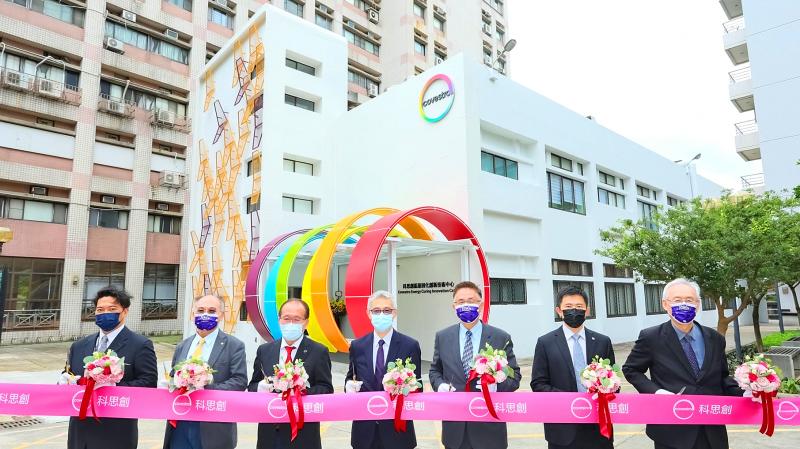Covestro Taiwan Ltd (台灣科思創) yesterday launched a new research and development center that is to specialize in resin synthesis and fiberoptic coating after its parent company, Covestro AG, acquired a resins business from Royal DSM, it said.
The German company in September 2020 agreed to buy the resins and functional materials business from Royal DSM for about 1.61 billion euros (US$1.69 billion), corporate data showed.
The Dutch company’s local units, such as Covestro Resins (ROA) Ltd (帝昇) and Covestro Resins (Taiwan) Ltd (新力美), are next month to be integrated into Covestro Taiwan Ltd, with their employees continuing resins development, Covestro Taiwan said.

Photo courtesy of Covestro Taiwan Ltd
The Covestro Global Energy Curing Innovation Center was established at National Central University (NCU) in Taoyuan as part of its collaboration with local universities, the company said.
The 1,322m2 facility marks the first global research center located on a Taiwanese university campus and managed by a foreign company, it said.
Aiming to find new solutions to make its ultraviolet (UV)-cured resin synthesis process more sustainable, the company asked eight NCU professors, along with about 20 students, to work on four projects, and expects results by the end of next year, research center head Steve Shih (石健學) told the Taipei Times in an interview.
“Tin is a key production component, and we have managed to minimize tin residues to lower than one part per million, but in the event something goes wrong, we need another material with comparable performance that can substitute for tin,” Shih said, citing an example of one of the center’s projects.
The company is also attempting to seek appropriate bio-based materials, such as plant matter, to replace fossil-based material, as 25 percent of its products are to be made from bio-based materials by 2030, Shih said.
Covestro Taiwan is also working with National Taiwan University and National Chung Hsing University on cutting-edge research on resin development, Shih added.
UV-curable resin is used in a variety of coating applications for fiber optic cables, solar panels, electronic materials, ink printing, floors, premium wood items and papers, Covestro Resins Ltd general manager Troy Shao (邵仲益) told the Taipei Times.
It can also be used inside computing technology given its ability to refract light, Shao said.
A leading Taiwanese semiconductor company has utilized Covestro Taiwan’s technology to make its manufacturing process more sustainable and efficient, he said.
Covestro Taiwan is optimistic that its technology will be applied in Taiwanese 5G networks and to help install thinner glass fibers, he added.

US sports leagues rushed to get in on the multi-billion US dollar bonanza of legalized betting, but the arrest of an National Basketball Association (NBA) coach and player in two sprawling US federal investigations show the potential cost of partnering with the gambling industry. Portland Trail Blazers coach Chauncey Billups, a former Detroit Pistons star and an NBA Hall of Famer, was arrested for his alleged role in rigged illegal poker games that prosecutors say were tied to Mafia crime families. Miami Heat guard Terry Rozier was charged with manipulating his play for the benefit of bettors and former NBA player and

The DBS Foundation yesterday announced the launch of two flagship programs, “Silver Motion” and “Happier Caregiver, Healthier Seniors,” in partnership with CCILU Ltd, Hondao Senior Citizens’ Welfare Foundation and the Garden of Hope Foundation to help Taiwan face the challenges of a rapidly aging population. The foundation said it would invest S$4.91 million (US$3.8 million) over three years to foster inclusion and resilience in an aging society. “Aging may bring challenges, but it also brings opportunities. With many Asian markets rapidly becoming super-aged, the DBS Foundation is working with a regional ecosystem of like-minded partners across the private, public and people sectors

BREAKTHROUGH TECH: Powertech expects its fan-out PLP system to become mainstream, saying it can offer three-times greater production throughput Chip packaging service provider Powertech Technology Inc (力成科技) plans to more than double its capital expenditures next year to more than NT$40 billion (US$1.31 billion) as demand for its new panel-level packaging (PLP) technology, primarily used in chips for artificial intelligence (AI) applications, has greatly exceeded what it can supply. A significant portion of the budget, about US$1 billion, would be earmarked for fan-out PLP technology, Powertech told investors yesterday. Its heavy investment in fan-out PLP technology over the past 10 years is expected to bear fruit in 2027 after the technology enters volume production, it said, adding that the tech would

YEAR-END BOOST: The holiday shopping season in the US and Europe, combined with rising demand for AI applications, is expected to drive exports to a new high, the NDC said Taiwan’s business climate monitor improved last month, transitioning from steady growth for the first time in five months, as robust global demand for artificial intelligence (AI) products and new iPhone shipments boosted exports and corporate sales, the National Development Council (NDC) said yesterday. The council uses a five-color system to measure the nation’s economic state, with “green” indicating steady growth, “red” suggesting a boom and “blue” reflecting a recession. “Yellow-red” and “yellow-blue” suggest a transition to a stronger or weaker condition. The total score of the monitor’s composite index rose to 35 points from a revised 31 in August, ending a four-month